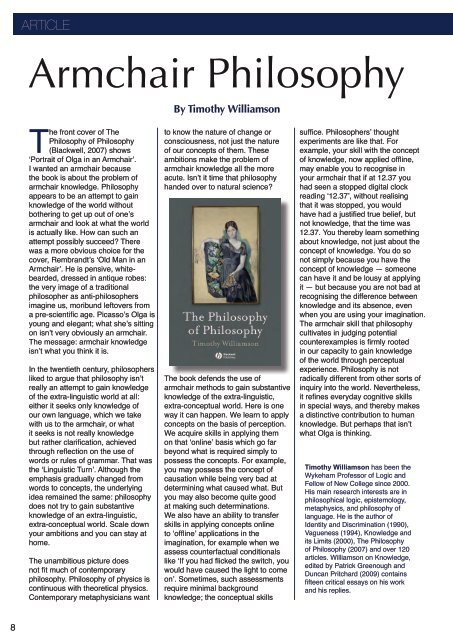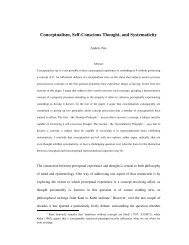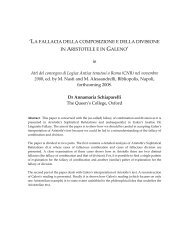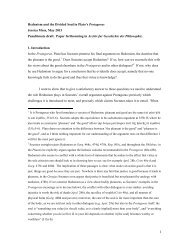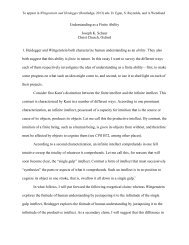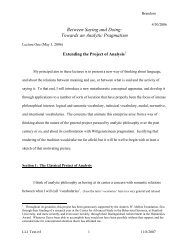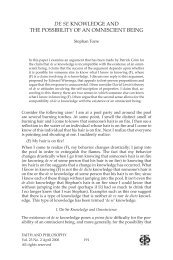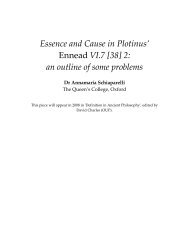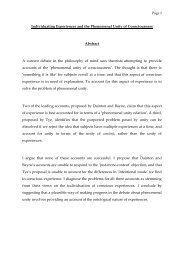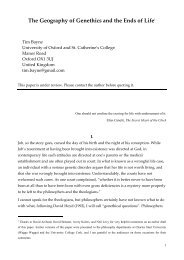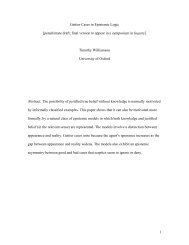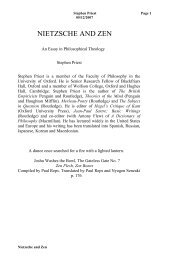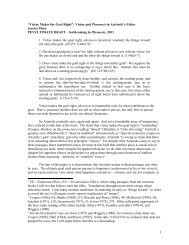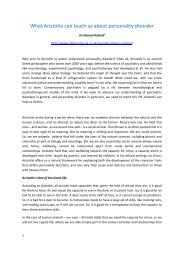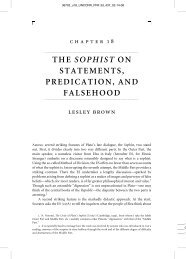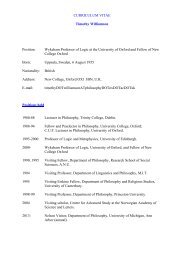OxfordPhilosophy - Faculty of Philosophy - University of Oxford
OxfordPhilosophy - Faculty of Philosophy - University of Oxford
OxfordPhilosophy - Faculty of Philosophy - University of Oxford
You also want an ePaper? Increase the reach of your titles
YUMPU automatically turns print PDFs into web optimized ePapers that Google loves.
Article<br />
Armchair <strong>Philosophy</strong><br />
By Timothy Williamson<br />
The front cover <strong>of</strong> The<br />
<strong>Philosophy</strong> <strong>of</strong> <strong>Philosophy</strong><br />
(Blackwell, 2007) shows<br />
‘Portrait <strong>of</strong> Olga in an Armchair’.<br />
I wanted an armchair because<br />
the book is about the problem <strong>of</strong><br />
armchair knowledge. <strong>Philosophy</strong><br />
appears to be an attempt to gain<br />
knowledge <strong>of</strong> the world without<br />
bothering to get up out <strong>of</strong> one’s<br />
armchair and look at what the world<br />
is actually like. How can such an<br />
attempt possibly succeed? There<br />
was a more obvious choice for the<br />
cover, Rembrandt’s ‘Old Man in an<br />
Armchair’. He is pensive, whitebearded,<br />
dressed in antique robes:<br />
the very image <strong>of</strong> a traditional<br />
philosopher as anti-philosophers<br />
imagine us, moribund leftovers from<br />
a pre-scientific age. Picasso’s Olga is<br />
young and elegant; what she’s sitting<br />
on isn’t very obviously an armchair.<br />
The message: armchair knowledge<br />
isn’t what you think it is.<br />
In the twentieth century, philosophers<br />
liked to argue that philosophy isn’t<br />
really an attempt to gain knowledge<br />
<strong>of</strong> the extra-linguistic world at all:<br />
either it seeks only knowledge <strong>of</strong><br />
our own language, which we take<br />
with us to the armchair, or what<br />
it seeks is not really knowledge<br />
but rather clarification, achieved<br />
through reflection on the use <strong>of</strong><br />
words or rules <strong>of</strong> grammar. That was<br />
the ‘Linguistic Turn’. Although the<br />
emphasis gradually changed from<br />
words to concepts, the underlying<br />
idea remained the same: philosophy<br />
does not try to gain substantive<br />
knowledge <strong>of</strong> an extra-linguistic,<br />
extra-conceptual world. Scale down<br />
your ambitions and you can stay at<br />
home.<br />
The unambitious picture does<br />
not fit much <strong>of</strong> contemporary<br />
philosophy. <strong>Philosophy</strong> <strong>of</strong> physics is<br />
continuous with theoretical physics.<br />
Contemporary metaphysicians want<br />
to know the nature <strong>of</strong> change or<br />
consciousness, not just the nature<br />
<strong>of</strong> our concepts <strong>of</strong> them. These<br />
ambitions make the problem <strong>of</strong><br />
armchair knowledge all the more<br />
acute. Isn’t it time that philosophy<br />
handed over to natural science?<br />
The book defends the use <strong>of</strong><br />
armchair methods to gain substantive<br />
knowledge <strong>of</strong> the extra-linguistic,<br />
extra-conceptual world. Here is one<br />
way it can happen. We learn to apply<br />
concepts on the basis <strong>of</strong> perception.<br />
We acquire skills in applying them<br />
on that ‘online’ basis which go far<br />
beyond what is required simply to<br />
possess the concepts. For example,<br />
you may possess the concept <strong>of</strong><br />
causation while being very bad at<br />
determining what caused what. But<br />
you may also become quite good<br />
at making such determinations.<br />
We also have an ability to transfer<br />
skills in applying concepts online<br />
to ‘<strong>of</strong>fline’ applications in the<br />
imagination, for example when we<br />
assess counterfactual conditionals<br />
like ‘If you had flicked the switch, you<br />
would have caused the light to come<br />
on’. Sometimes, such assessments<br />
require minimal background<br />
knowledge; the conceptual skills<br />
suffice. Philosophers’ thought<br />
experiments are like that. For<br />
example, your skill with the concept<br />
<strong>of</strong> knowledge, now applied <strong>of</strong>fline,<br />
may enable you to recognise in<br />
your armchair that if at 12.37 you<br />
had seen a stopped digital clock<br />
reading ‘12.37’, without realising<br />
that it was stopped, you would<br />
have had a justified true belief, but<br />
not knowledge, that the time was<br />
12.37. You thereby learn something<br />
about knowledge, not just about the<br />
concept <strong>of</strong> knowledge. You do so<br />
not simply because you have the<br />
concept <strong>of</strong> knowledge — someone<br />
can have it and be lousy at applying<br />
it — but because you are not bad at<br />
recognising the difference between<br />
knowledge and its absence, even<br />
when you are using your imagination.<br />
The armchair skill that philosophy<br />
cultivates in judging potential<br />
counterexamples is firmly rooted<br />
in our capacity to gain knowledge<br />
<strong>of</strong> the world through perceptual<br />
experience. <strong>Philosophy</strong> is not<br />
radically different from other sorts <strong>of</strong><br />
inquiry into the world. Nevertheless,<br />
it refines everyday cognitive skills<br />
in special ways, and thereby makes<br />
a distinctive contribution to human<br />
knowledge. But perhaps that isn’t<br />
what Olga is thinking.<br />
Timothy Williamson has been the<br />
Wykeham Pr<strong>of</strong>essor <strong>of</strong> Logic and<br />
Fellow <strong>of</strong> New College since 2000.<br />
His main research interests are in<br />
philosophical logic, epistemology,<br />
metaphysics, and philosophy <strong>of</strong><br />
language. He is the author <strong>of</strong><br />
Identity and Discrimination (1990),<br />
Vagueness (1994), Knowledge and<br />
its Limits (2000), The <strong>Philosophy</strong><br />
<strong>of</strong> <strong>Philosophy</strong> (2007) and over 120<br />
articles. Williamson on Knowledge,<br />
edited by Patrick Greenough and<br />
Duncan Pritchard (2009) contains<br />
fifteen critical essays on his work<br />
and his replies.<br />
8


